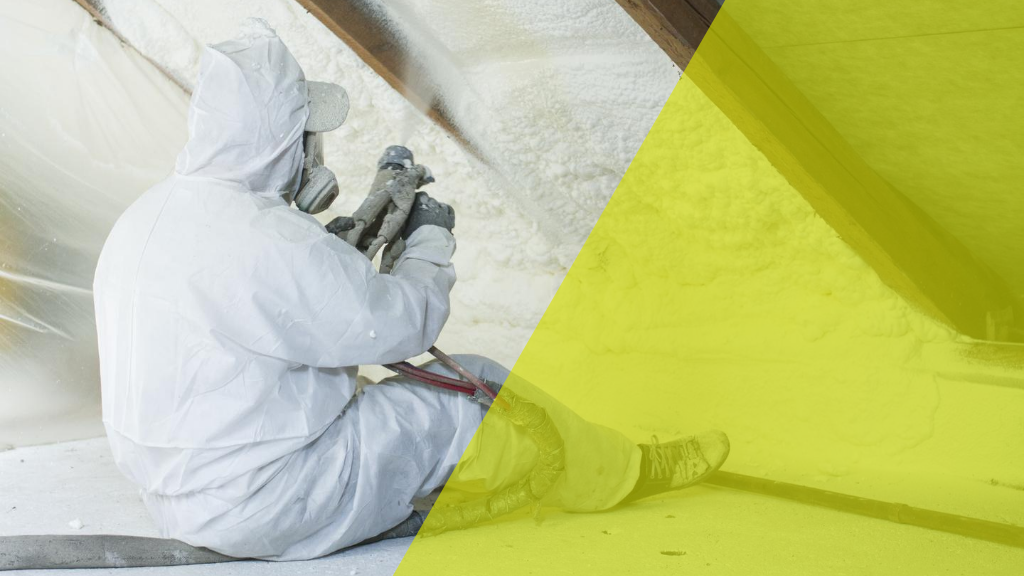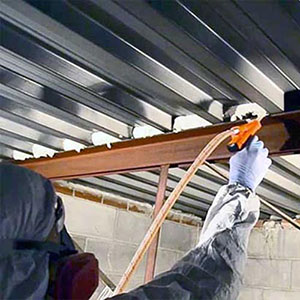Recognizing the Benefits of Using Spray Foam for Insulation Projects
Recognizing the Benefits of Using Spray Foam for Insulation Projects
Blog Article
Spray Foam: The Ultimate Service for Air Sealing and Insulation
Spray foam insulation has actually emerged as a leading solution for effective air securing and thermal insulation, using an unique mix of residential properties that set it apart from traditional techniques. Recognizing the complete range of its advantages, installment procedures, and contrasts with various other insulation types is important for making informed decisions.
What Is Spray Foam?
Spray foam is a flexible insulation product that combines the concepts of air securing and thermal resistance to enhance power performance in structures. Composed primarily of polyurethane or various other comparable compounds, spray foam is applied as a liquid that expands upon call with surface areas, producing a solid, continuous layer of insulation. This unique residential or commercial property enables it to fill spaces, fractures, and spaces that traditional insulation products might ignore, offering an exceptional air seal.
There are two primary kinds of spray foam: open-cell and closed-cell. Open-cell spray foam is lighter and much more versatile, offering superb sound absorption and a lower R-value per inch - Spray Foam. In comparison, closed-cell spray foam is denser, giving a greater R-value, moisture resistance, and added structural honesty to constructing parts
The application procedure normally involves customized equipment, making sure a smooth application that abides by different substratums, consisting of concrete, metal, and wood. This adaptability makes spray foam ideal for both new building and constructions and retrofitting existing structures. Its capability to produce an airtight barrier substantially contributes to reducing energy consumption and enhancing interior air quality, thus making it a favored choice among contractors and property owners alike.
Advantages of Spray Foam Insulation
One of the most considerable benefits of spray foam insulation is its outstanding ability to develop a continuous air obstacle, which properly lessens power loss. Unlike standard insulation materials, spray foam expands to fill spaces and cracks, making sure that air leak is significantly decreased. This characteristic not just improves energy effectiveness however likewise brings about lower utility bills in time.
In addition, spray foam insulation supplies superior thermal resistance, contributing to a more secure interior setting. Its high R-value per inch allows for reliable insulation in constrained spaces, making it optimal for attic rooms, wall surfaces, and crawl areas. The moisture-resistant residential properties of spray foam aid prevent mold and mold development, advertising much healthier living problems.
Another vital benefit of spray foam insulation is its sound-dampening qualities (Spray Foam). It efficiently minimizes sound transmission in between rooms, developing a quieter and more comfortable home atmosphere. The longevity of spray foam additionally attracts attention, as it does not droop or resolve over time, maintaining its efficiency throughout its life-span
Exactly How Spray Foam Functions
Comprehending just how spray foam insulation functions is vital for appreciating its effectiveness in air sealing and thermal resistance. Spray foam insulation contains two key elements: isocyanate and polyol material. When these elements are blended, they go through a chain reaction that triggers the material to expand quickly, producing a dense foam that loads spaces, cavities, and splits.
As the foam broadens, it follows surfaces, developing an airtight seal that significantly decreases air infiltration. This characteristic makes spray foam insulation highly effective at avoiding drafts and moisture infiltration, which can lead to energy loss and damage with time. In addition, the closed-cell variation of spray foam provides superior thermal resistance because of its inflexible structure, successfully decreasing heat transfer.
The distinct properties of spray foam allow it to adapt to uneven surface areas, ensuring extensive protection and a smooth barrier. Therefore, spray foam insulation not just improves energy effectiveness however likewise adds to enhanced interior click now air top quality by lowering the buildup of toxins and irritants. Inevitably, recognizing the auto mechanics behind spray foam highlights its function as an exceptional choice for insulation and air securing in both business and property applications.
Installment Refine Summary

Prior to setup, the space has to be effectively cleaned and prepped, ensuring that surface areas are cost-free from particles, moisture, and dirt. This action is crucial due to the fact that pollutants can endanger bond and total efficiency. Once the location is prepared, the application involves blending both components of the spray foam, which broadens upon contact and fills up gaps properly.
Trained specialists should conduct the setup, using specialized tools to make certain uniform coverage and optimal density. Security preventative measures, including wearing protective gear and making advice sure correct air flow, are essential during this procedure. After application, the foam typically treatments promptly, creating a strong obstacle that boosts power effectiveness.
Contrasting Spray Foam to Traditional Insulation
When evaluating insulation options, spray foam insulation stands out in contrast to standard products such as fiberglass and cellulose. One of the primary benefits of spray foam is its remarkable air securing abilities. Unlike fiberglass and cellulose, which can allow air infiltration, spray foam expands upon application, filling holes and spaces to produce an airtight seal. This results in enhanced power effectiveness, as less heated or cooled down air gets away the home, resulting in reduced energy bills.
Furthermore, spray foam gives a higher R-value per inch than traditional insulation types, offering more efficient thermal resistance in a thinner account. This characteristic is specifically valuable in spaces with restricted tooth cavity depth. Spray foam is immune to moisture and mold and mildew growth, which can be a considerable concern with cellulose and fiberglass, particularly in humid environments.
Nonetheless, spray foam insulation commonly brings a higher ahead of time expense than its typical counterparts. Home owners must consider this preliminary financial investment against lasting power savings and efficiency advantages. Eventually, while both insulation kinds serve their objective, spray foam becomes an advanced solution for contemporary insulation needs, specifically in terms of air securing and thermal effectiveness.

Final Thought
In recap, spray foam insulation represents an extremely reliable solution for accomplishing optimal air securing and thermal resistance. Its distinct residential or commercial properties, consisting of dampness resistance and audio dampening, make it appropriate for different applications in both brand-new building and constructions and retrofitting projects (Spray Foam). The initial prices might be greater compared to traditional insulation products, the long-lasting benefits, such as substantial power financial savings and enhanced indoor air top quality, validate the investment and emphasize its worth in modern structure methods.
Spray More Bonuses foam insulation has emerged as a leading remedy for efficient air sealing and thermal insulation, supplying an unique mix of buildings that set it apart from typical approaches.Spray foam is a flexible insulation product that integrates the concepts of air sealing and thermal resistance to boost energy performance in buildings.When reviewing insulation choices, spray foam insulation stands out in contrast to conventional products such as fiberglass and cellulose. Ultimately, while both insulation kinds serve their function, spray foam arises as a much more innovative service for modern-day insulation needs, specifically in terms of air sealing and thermal performance.
In summary, spray foam insulation stands for an extremely efficient solution for accomplishing optimal air securing and thermal resistance.
Report this page